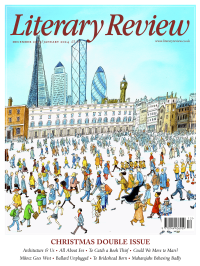Eamon Duffy
How the Pope Became Infallible
Losing a Kingdom, Gaining the World: The Catholic Church in the Age of Revolution and Democracy
By Ambrogio A Caiani
Apollo 560pp £30
Ambrogio Caiani’s long and lively survey of the Catholic Church’s relations with Europe and the wider world from the beginning of the 18th century to the start of the 20th has a single central thesis: that the reactionary resistance of successive popes to the inexorable march of political and social modernity was a tragic catalogue of lost opportunities. The papacy’s timid and blinkered refusal to accept and adapt to the inevitable erosion of Catholicism’s social and political monopoly locked it, and the Catholic Church it presided over, into a ‘deeply dysfunctional relationship’ with the modern world. Paradoxically, that very intransigence greatly enhanced the authority of the popes within the Church itself, a dominance consummated in the creation of the doctrine of papal infallibility in 1870 by the First Vatican Council and bolstered by the papacy’s embrace and encouragement of new and increasingly supernaturalised forms of popular piety, such as miraculous sightings of the Virgin Mary. But in the process, Caiani argues, it forfeited any opportunity to ‘re-engage’ with secular democracy. Above all, the refusal of successive popes to accept the 19th-century movement for Italian reunification, which put an end to the papacy’s thousand-year rule over much of the peninsula, locked the Church into a posture of defiant irrelevance. ‘Safely ensconced behind the Vatican walls, the Roman church evaded its social vocation,’ Caiani writes.
The broad outlines of Caiani’s narrative are familiar enough. Much the same material has recently been handled more briefly in the early chapters of John T McGreevy’s Catholicism: A Global History. Caiani’s book inevitably centres on the religious consequences of the French Revolution. After the short-lived experiment of a national

Sign Up to our newsletter
Receive free articles, highlights from the archive, news, details of prizes, and much more.@Lit_Review
Follow Literary Review on Twitter
Twitter Feed
How to ruin a film - a short guide by @TWHodgkinson:
Thomas W Hodgkinson - There Was No Sorcerer
Thomas W Hodgkinson: There Was No Sorcerer - Box Office Poison: Hollywood’s Story in a Century of Flops by Tim Robey
literaryreview.co.uk
How to ruin a film - a short guide by @TWHodgkinson:
Thomas W Hodgkinson - There Was No Sorcerer
Thomas W Hodgkinson: There Was No Sorcerer - Box Office Poison: Hollywood’s Story in a Century of Flops by Tim Robey
literaryreview.co.uk
Give the gift that lasts all year with a subscription to Literary Review. Save up to 35% on the cover price when you visit us at https://literaryreview.co.uk/subscribe and enter the code 'XMAS24'